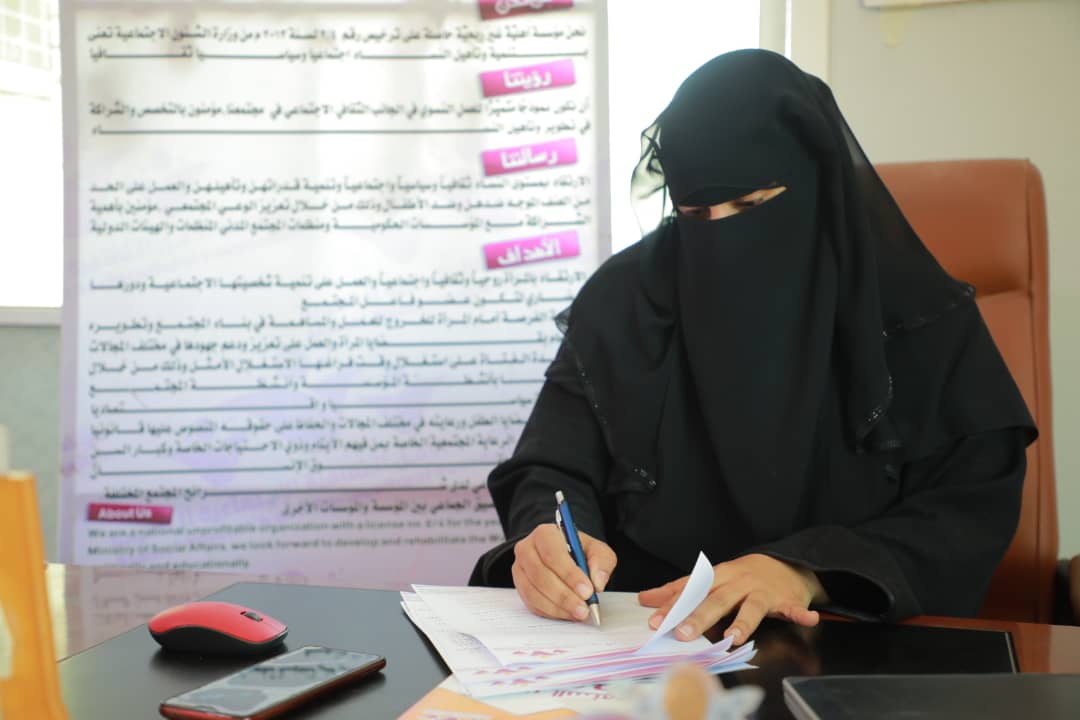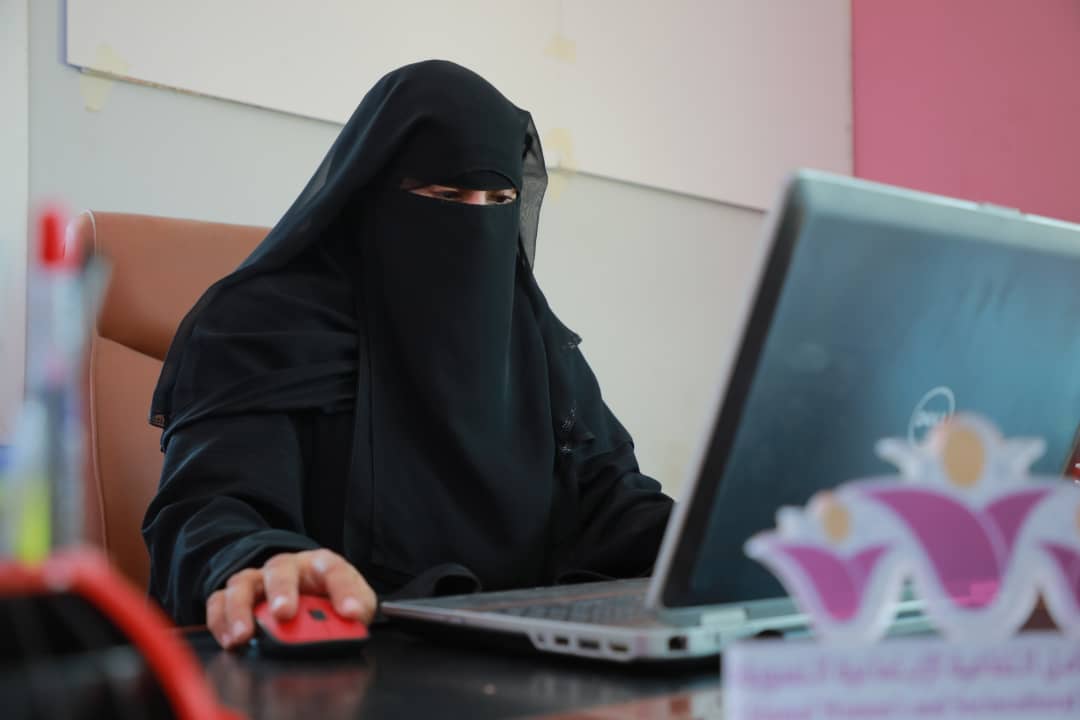Ten years ago, Abaha decided to actively engage in civil society to support and empower women in Hadhramaut Governorate, eastern Yemen, in a way that ensures women raise their voices and are being heard, based on a general vision that she pictured while studying medicine in Sana’a in 2008.
Dr. Abaha Baowayadan founded the Women’s Social and Cultural Hope Foundation in April 2013 in Mukalla. Within it, many women's volunteer teams were created with the aim of bringing about social changes by raising awareness in society to confront many negative practices that the community engages in, especially regarding women's issues and the most vulnerable groups in terms of legal, economic, and social matters. She was honored as one of the ten most influential women in the Arab World for her initiative (Axohom), an annual initiative to clothe 3,000 families in need.
First Turn
Dr. Abaha was influenced by community work while studying medicine in Sana’a as she witnessed seven years of feminist movement and openness to civil work through which women in the capital of Sana’a made a great mark. When she returned to Hadhramaut, the situation was completely different compared to Sana’a, which pushed her to establish a foundation supporting women that tries to change the societal perceptions toward women.
Women in Hadhramaut are not accepted to work in the field and also face great difficulties in the countryside. Abaha tried to overcome the first turning point in her work which she remembers: “Mothers used to come to the Foundation with their daughters to reassure themselves that there were no males, but when they saw that the Foundation was staffed by women, they left them for activities and events with confidence".
Today, after ten years of community experience, Al-Amal Foundation has been able to develop and support female leaders for community work and decision-making centers, including the head of the businesswomen’s sector in the Chamber of Commerce, the director of research in the Administrative Research Development Department in the governorate office, the general director of research and administrative development in the governorate office, and the director of an educational complex in one of the villages (Reida Al-juhayen), and the director of legal affairs at Al-Mukalla Hospital. All of them were affiliated and volunteers at the Al-Amal Foundation.
The Initiative Still going!
Earlier in 2017 citizens informed Dr. Abaha of the presence of Internally Displaced People (IDP) sleeping on the ground under the Mukalla Bridge. When she confirmed the matter, she was surprised by the presence of six families from the Hais District, south of Hodaidah. After speaking with them it turned out that 15 other families from the same directorate were living in a similar situation. Their relatives knocked on the doors of civil society organizations and no one responded to them.
Abaha immediately contacted the local authority asking about a place to shelter displaced families, but they replied that there was no place, and under her insistence a committee was formed from the Security Department and the director of the Mukalla Directorate in addition to social affairs. This committee approved in a joint meeting with Dr. Abaha the transfer of the IDPs to Dawagen area in the Foua area west of the city of Mukalla.
One-night Abaha ’s phone rings and the call are from one of the displaced women asking for help after hearing shots being fired in the sky of the camp, and voices calling them to evacuate the place. Amidst the fear of the women and the wailing of the children, the situation was dangerous, so Abaha was forced to contact the local authority again. He asked to move the IDPs to another safer place even though the place had been prepared with tents and toilets.
Abaha was legally responsible for evacuating the IDPs and finding a place for them in a way that did not conflict with their rights to have a safe location. With the help of the local authority, she could secure a temporary place for the IDPs in a government facility.
Earlier in 2022 another location was identified for the IDPs after a meeting with one of the governorate’s agents and the Director of the Directorate. Dr. Abaha , through the Foundation, took care of all humanitarian services for the IDPs and stipulated that electricity be provided to them, but that was not done. Abaha says that “One of the most significant issues that IDPs still face until now, and which we hope the authorities will solve,is providing the camp with electricity.”
Stories from the Camp
Dr. Abaha ’s intervention does not stop at the level of providing basic services and aid to IDPs but goes beyond that to the personal level. Karima, one of the displaced women whom Dr. Abaha helped, was sick with hemolytic anemia and was in dire need of splenectomy, and before the operation she needed a vaccine. It was not available, so Dr. Abaha ordered it from Saudi Arabia through supportive parties and did all she could until Karima had the surgery.
Karima was unable to walk and every two days she went to the hospital to get blood, which the Hope Foundation provided to her for five months for free until she had the surgery. After the surgery, she started her life and is now working to support herself and her family.
In the camp, the Foundation provided a spinning machine for men's traditional clothing (Al Sobaeat), so the displaced men and women used it as a source of income for them.
Dr. Abaha also succeeded in convincing a number of hospitals in the Mukalla directorate to provide complete free health care to IDP families in which Al-Amal Foundation sponsored half of the value and the other half be collected from merchants and associations.

A Special Kind of Fight!
There are no limits to Dr. Abaha ’s work. In addition to her humanitarian interventions, she has other contributions as she and seven other women led an advocacy campaign to open Al-Rayyan Airport and Al-Dhabbah Road, which were closed for security reasons.
Dr. Abaha and her female colleagues thought about their campaign in a creative way to reopen Al-Rayyan Airport. They conducted workshops and visits to parties concerned with the issue, held art exhibitions for children to draw about the issue, and in addition they produced a weekly podcast to introduce humanitarian stories affected by the closure of the airport, after which they received a call from officials, asking them to stop the podcast until further notice.
On the “Al-Dhabbah” road, which is the link between Al-Mukalla, the capital of the governorate and the eastern directorates, the road was blocked for security reasons after terrorist groups left the coast of Hadhramaut, forcing citizens to go through the trouble of traveling a long and dangerous road.
Prices rose with the collapse of the national currency and the cost of transportation became double for students from the eastern areas. So, 350 students started a protest in front of the university and announced the suspension of studies due to their inability to pay transportation fees. Al-Amal Foundation intervened to restore hope to these students and implemented a campaign to reopen the Al-Dhabbah road. “In order to shorten the distance and reduce the cost to the students’, Dr. Abha says: “Al-Amal Foundation provided the solution by approving transportation fees for the senior year students of the 300 students through the Foundation. As for the rest students, we took the outstanding students and paid them the fees, and we also launched a community movement to open the road by bringing the local authority, security, parties, and associations together in a workshop and asking them to solve it.”
A while later Al-Dhabbah Road was partially open from six in the morning until six in the evening and students were able to move through it and reach their colleges. Also, Al Rayyan airport was partially opened for one internal flight between Aden and Socotra!